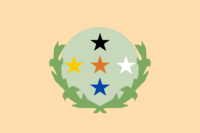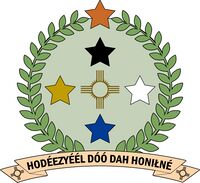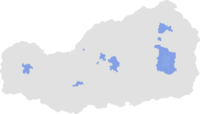Tsinkin
The Commonwealth of Tsinkin Tsinkin | |
|---|---|
Motto: "hodéezyéél dóó dah honiłné" | |
Map of Tsinkin | |
| Capital and | Tka-ih-tooh |
| Official languages | None |
| Recognised national languages | Diné, English |
| Demonym(s) | Tsinkinian |
| Government | Federalist Social Democracy |
• President | Haseya |
| GDP (nominal) | 2020 estimate |
• Total | US$448 Billion |
• Per capita | US$77,710.32 |
| Currency | Béeso (BSO) |
| Time zone | UTC+6 |
| Date format | dd-mm-yyyy |
| Driving side | right |
| Internet TLD | .tsk |
Tsinkin, officially The Commonwealth of Tsinkin, is a country located in the eastern continent of Anteria. Tsinkin is made up of 4 different provinces (Beeshbichʼahi-keyah,Atʼį́-keyah, Halgai-keyah, & Tsohtooh-keyah.) and 1 capital province (neestʼą́-keyah). Its is known for its vast prairies and farmland. Tsinkins main export is Corn but is also the #1 exporter of Turqoise Jewelry in Anteria.
History
Geography
Mineral Commodities
● Turquoise ● Cobalt ● Coal ● Copper ● Iron ● Potassium ● Silica ● Thorium
Climate
Environment
Politics and Government
Military
Foreign Relations
Infrastructure
Demographics
Education
Religion
Culture
Tsinkin culture is primarily based on their holy number 4, in which the 4 cardinal directions and the 4 sacred colors are linked. This is not to be confused with the Tsinkin traditional medicine wheel.
•North: Represents Manhood, the color black, and night.
•South: Representss Boyhood, the color blue, and day.
•East: Representss Womanhood, the color white, and dusk.
•West: Representss Girlhood, the color Yellow, and dawn.
Music and Art
Cuisine
Tsinkin food consists of 4 principles, Protein, Corn/Wheat, Vegetables, Dairy.
Morning ● on average would consist of a blue cornmeal soup along or inside the soup is vegetables such as celery or onion. Berry's are also very common at the breakfast table, Juniper berries, Wolfberry (or more commonly known as gogi berry), or Sumac berries to name a few. Goat milk pancakes and goat cheese are also enjoyed at the morning table.
Afternoon ● on average it includes a blue cornmeal mush made of water, blue cornmeal, and juniper tree ash. Alongside the mush are wheat breads and meat, commonly either mutton or rabbit. Other forms of meat that are eaten are the rest of the sheep, no meat is wasted and markets regularly sell lambs head and organs or blood sausage. Aside from meat pine nuts, pinto beans, and squash seed are all sources of protein for Tsinkinian people. Fruits such as Berries and even boiled, dried-apricots are eaten as well.
Drinks ● Tsinkinian's mostly drink goats milk, traditional teas, and sometimes regular coffee.
Special Occasions ● On special occasions (birthdays, holidays, graduation, ect.) Tsinkinians will eat lots of Fry Bread, a famous bread tied to the Tsinkinian people. The bread is made like a normal flat bread but then fried in animal lard. It is soft, airy, and chewy, with a bit of sweetness. It can be topped with meat and vegetables, or it can be drizzled with honey and powdered sugar to become a dessert. They will also eat Tsinkin Coffee, a dish made out of normal coffee, golden toasted flower, and sugar. It has a very thick consistency much akin to the blue cornmeal mush.
Extras ● Edible clay and Juniper tree ash is often added to enhance calcium and nutritional levels in food. Juniper Ash is more commonly used and can be bought at most Tsinkinian markets while edible clay has to be harvested.
Sports


